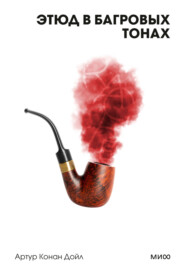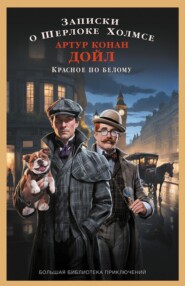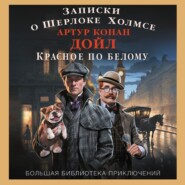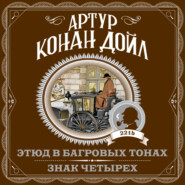По всем вопросам обращайтесь на: info@litportal.ru
(©) 2003-2025.
✖
The Adventures of Gerard
Настройки чтения
Размер шрифта
Высота строк
Поля
“If you and I were face to face and alone, I should let you see which is the better man,” said I.
For answer the brute struck me across the face with his open hand. I seized him by the throat, but a dozen of his soldiers tore me away from him, and he struck me again while they held my hands.
“You base hound,” I cried, “is this the way to treat an officer and a gentleman?”
“We never asked you to come to Russia,” said he. “If you do you must take such treatment as you can get. I would shoot you off-hand if I had my way.”
“You will answer for this some day,” I cried, as I wiped the blood from my moustache.
“If the Hetman Platoff is of my way of thinking you will not be alive this time to-morrow,” he answered, with a ferocious scowl. He added some words in Russian to his troops, and instantly they all sprang to their saddles.
Poor Violette, looking as miserable as her master, was led round and I was told to mount her. My left arm was tied with a thong which was fastened to the stirrup-iron of a sergeant of Dragoons. So in most sorry plight I and the remnant of my men set forth from Minsk.
Never have I met such a brute as this man Sergine, who commanded the escort. The Russian army contains the best and the worst in the world, but a worse than Major Sergine of the Dragoons of Kieff I have never seen in any force outside of the guerillas of the Peninsula.
He was a man of great stature, with a fierce, hard face and a bristling black beard, which fell over his cuirass.
I have been told since that he was noted for his strength and his bravery, and I could answer for it that he had the grip of a bear, for I had felt it when he tore me from my saddle. He was a wit, too, in his way, and made continual remarks in Russian at our expense which set all his Dragoons and Cossacks laughing. Twice he beat my comrades with his riding-whip, and once he approached me with the lash swung over his shoulder, but there was something in my eyes which prevented it from falling.
So in misery and humiliation, cold and starving, we rode in a disconsolate column across the vast snow-plain. The sun had sunk, but still in the long northern twilight we pursued our weary journey. Numbed and frozen, with my head aching from the blows it had received, I was borne onward by Violette, hardly conscious of where I was or whither I was going. The little mare walked with a sunken head, only raising it to snort her contempt for the mangy Cossack ponies who were round her.
But suddenly the escort stopped, and I found that we had halted in the single street of a small Russian village.
There was a church on one side, and on the other was a large stone house, the outline of which seemed to me to be familiar. I looked around me in the twilight, and then I saw that we had been led back to Dobrova, and that this house at the door of which we were waiting was the same house of the priest at which we had stopped in the morning. Here it was that my charming Sophie in her innocence had translated the unlucky message which had in some strange way led us to our ruin. To think that only a few hours before we had left this very spot with such high hopes and all fair prospects for our mission, and now the remnants of us waited as beaten and humiliated men for whatever lot a brutal enemy might ordain! But such is the fate of the soldier, my friends – kisses to-day, blows to-morrow. Tokay in a palace, ditch-water in a hovel, furs or rags, a full purse or an empty pocket, ever swaying from the best to the worst, with only his courage and his honour unchanging.
The Russian horsemen dismounted, and my poor fellows were ordered to do the same. It was already late, and it was clearly their intention to spend the night in this village. There were great cheering and joy amongst the peasants when they understood that we had all been taken, and they flocked out of their houses with flaming torches, the women carrying out tea and brandy for the Cossacks. Amongst others the old priest came forth – the same whom we had seen in the morning. He was all smiles now, and he bore with him some hot punch on a salver, the reek of which I can remember still. Behind her father was Sophie. With horror I saw her clasp Major Sergine’s hand as she congratulated him upon the victory he had won and the prisoners he had made. The old priest, her father, looked at me with an insolent face and made insulting remarks at my expense, pointing at me with his lean and grimy hand. His fair daughter Sophie looked at me also, but she said nothing, and I could read her tender pity in her dark eyes. At last she turned to Major Sergine and said something to him in Russian, on which he frowned and shook his head impatiently.
She appeared to plead with him, standing there in the flood of light which shone from the open door of her father’s house. My eyes were fixed upon the two faces, that of the beautiful girl and of the dark, fierce man, for my instinct told me that it was my own fate which was under debate. For a long time the soldier shook his head, and then, at last softening before her pleadings, he appeared to give way. He turned to where I stood with my guardian sergeant beside me.
“These good people offer you the shelter of their roof for the night,” said he to me, looking me up and down with vindictive eyes. “I find it hard to refuse them, but I tell you straight that for my part I had rather see you on the snow. It would cool your hot blood, you rascal of a Frenchman!”
I looked at him with the contempt that I felt.
“You were born a savage and you will die one,” said I.
My words stung him, for he broke into an oath, raising his whip as if he would strike me.
“Silence, you crop-eared dog!” he cried. “Had I my way some of the insolence would be frozen out of you before morning.” Mastering his passion, he turned upon Sophie with what he meant to be a gallant manner. “If you have a cellar with a good lock,” said he, “the fellow may lie in it for the night, since you have done him the honour to take an interest in his comfort. I must have his parole that he will not attempt to play us any tricks, as I am answerable for him until I hand him over to the Hetman Platoff to-morrow.”
His supercilious manner was more than I could endure.
He had evidently spoken French to the lady in order that I might understand the humiliating way in which he referred to me.
“I will take no favour from you,” said I. “You may do what you like, but I will never give you my parole.”
The Russian shrugged his great shoulders, and turned away as if the matter were ended.
“Very well, my fine fellow, so much the worse for your fingers and toes. We shall see how you are in the morning after a night in the snow.”
“One moment, Major Sergine,” cried Sophie. “You must not be so hard upon this prisoner. There are some special reasons why he has a claim upon our kindness and mercy.”
The Russian looked with suspicion upon his face from her to me.
“What are the special reasons? You certainly seem to take a remarkable interest in this Frenchman,” said he.
“The chief reason is that he has this very morning of his own accord released Captain Alexis Barakoff, of the Dragoons of Grodno.”
“It is true,” said Barakoff, who had come out of the house. “He captured me this morning, and he released me upon parole rather than take me back to the French army, where I should have been starved.”
“Since Colonel Gerard has acted so generously you will surely, now that fortune has changed, allow us to offer him the poor shelter of our cellar upon this bitter night,” said Sophie. “It is a small return for his generosity.”
But the Dragoon was still in the sulks.
“Let him give me his parole first that he will not attempt to escape,” said he. “Do you hear, sir? Do you give me your parole?”
“I give you nothing,” said I.
“Colonel Gerard,” cried Sophie, turning to me with a coaxing smile, “you will give me your parole, will you not?”
“To you, mademoiselle, I can refuse nothing. I will give you my parole, with pleasure.”
“There, Major Sergine,” cried Sophie, in triumph, “that is surely sufficient. You have heard him say that he gives me his parole. I will be answerable for his safety.”
In an ungracious fashion my Russian bear grunted his consent, and so I was led into the house, followed by the scowling father and by the big, black-bearded Dragoon. In the basement there was a large and roomy chamber, where the winter logs were stored. Thither it was that I was led, and I was given to understand that this was to be my lodging for the night. One side of this bleak apartment was heaped up to the ceiling with fagots of firewood. The rest of the room was stone-flagged and bare-walled, with a single, deep-set window upon one side, which was safely guarded with iron bars. For light I had a large stable lantern, which swung from a beam of the low ceiling. Major Sergine smiled as he took this down, and swung it round so as to throw its light into every corner of that dreary chamber.
“How do you like our Russian hotels, monsieur?” he asked, with his hateful sneer. “They are not very grand, but they are the best that we can give you. Perhaps the next time that you Frenchmen take a fancy to travel you will choose some other country where they will make you more comfortable.” He stood laughing at me, his white teeth gleaming through his beard. Then he left me, and I heard the great key creak in the lock.
For an hour of utter misery, chilled in body and soul, I sat upon a pile of fagots, my face sunk upon my hands and my mind full of the saddest thoughts. It was cold enough within those four walls, but I thought of the sufferings of my poor troopers outside, and I sorrowed with their sorrow. Then I paced up and down, and I clapped my hands together and kicked my feet against the walls to keep them from being frozen. The lamp gave out some warmth, but still it was bitterly cold, and I had had no food since morning. It seemed to me that everyone had forgotten me, but at last I heard the key turn in the lock, and who should enter but my prisoner of the morning, Captain Alexis Barakoff. A bottle of wine projected from under his arm, and he carried a great plate of hot stew in front of him.
“Hush!” said he; “not a word! Keep up your heart! I cannot stop to explain, for Sergine is still with us. Keep awake and ready!” With these hurried words he laid down the welcome food and ran out of the room.
“Keep awake and ready!” The words rang in my ears. I ate my food and I drank my wine, but it was neither food nor wine which had warmed the heart within me. What could those words of Barakoff mean?
Why was I to remain awake? For what was I to be ready? Was it possible that there was a chance yet of escape? I have never respected the man who neglects his prayers at all other times and yet prays when he is in peril. It is like a bad soldier who pays no respect to the colonel save when he would demand a favour of him. And yet when I thought of the salt-mines of Siberia on the one side and of my mother in France upon the other, I could not help a prayer rising, not from my lips, but from my heart, that the words of Barakoff might mean all that I hoped. But hour after hour struck upon the village clock, and still I heard nothing save the call of the Russian sentries in the street outside.
Then at last my heart leaped within me, for I heard a light step in the passage. An instant later the key turned, the door opened, and Sophie was in the room.
“Monsieur – ” she cried.
“Etienne,” said I.
“Nothing will change you,” said she. “But is it possible that you do not hate me? Have you forgiven me the trick which I played you?”
“What trick?” I asked.
“Good heavens! Is it possible that even now you have not understood it? You have asked me to translate the despatch. I have told you that it meant, ‘If the French come to Minsk all is lost.’”
“What did it mean, then?”

















